Thank you to the Whyte Museum of the Canadian Rockies for granting permission to the Park Warden Service Alumni to post this interview on our website
Park Warden Service Alumni Society
Telephone Interview With Terry Damm
August 16th, 2018
Interview conducted by Christine Crilley-Everts
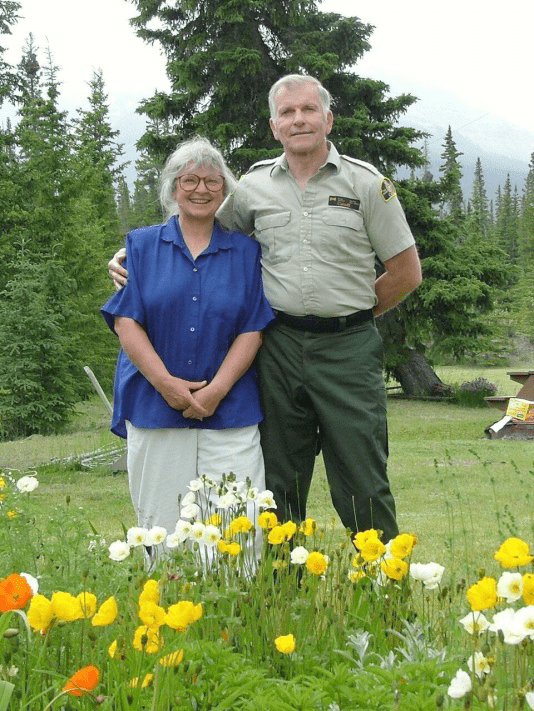
Marie & Terry at their favourite station, Saskatchewan River Crossing (2005)
Place and Date of Birth: Brantford Ontario. October 27, 1944.
Occupations: On the advice of a respected chemistry teacher, Terry headed west in the early 1970s. After working for the Lands and Forest department in Ontario, he was hired by the same department in Alberta. In 1973, Terry began his career with the national park warden service. A career that spanned 40 years and (five) different mountain parks.
Additional Information: Terry and his wife Marie keep very busy gardening and maintaining their acreage in northern British Columbia. Saskatchewan River Crossing and the people they met while in the service remain highlights of their warden lives.
If you could please start with your place and date of birth?
(0:17) Well, the birth date in the old system is 10/27/44 and I was born in Brantford Ontario.
“Is that where you grew up?
No, that was just the closest hospital. My dad was a minister, so we grew up in several towns, probably seven different towns in Ontario…
“So growing up in Ontario, how did you become involved in the warden service?”
Well, I worked for Lands and Forests when I was going to school in Ontario. When we came west, I dropped into the Alberta Lands and Forest office in Calgary and discovered a biologist whom I had worked for in Ontario and got a job then and there. That job was a project on the Spray River, on the boundary of Banff, and to its confluence with the Bow River. Banff Park was advertising for, I think, fire tower people. I responded to that first ad, just thinking national parks gave the opportunity to travel across the country but, with Parks, my first application, at least, was for a fire tower job.
“Did you come out west originally for adventure…?”
Well, I had been out west before. This trip out was on our honeymoon. My wife, Marie, had never been west. She had never seen the mountains, so I figured that’s the way to go. That, and my chemistry teacher in grade 13 in Ontario, advised me to go west!
“Would that have been the late 1960s?”
Ah, 1971. Well, his advice – that (our honeymoon) was after five years of university – he was my chemistry teacher in high school and based on my performance (in class), he advised me to “Go west young man.”
“What did you study in university? Did you continue with chemistry?”
No, political science and history with a biology minor. Journalism was my course direction, I guess, and I got summer jobs with the Lands and Forests while I was in school. I liked it enough that when I came west, I just looked for the same thing. Well, I didn’t give up on journalism. I did a little bit of writing and a little freelance photography. But it wasn’t my first love…We stopped and stayed in Banff for a few months (on our honeymoon). I worked at Sunshine Village and learned to ski, that type of thing… then we went back to Ontario and I worked with Lands and Forests again and my (first) job with Parks wasn’t until 1973.
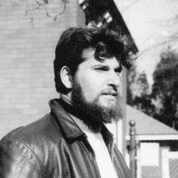
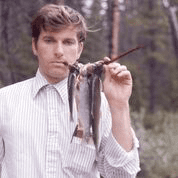
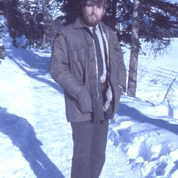
Photos taken around 1969, 1973 and 1977.
(3:43) My first job with Parks was in 1973 and that was as a ‘Patrolman’ for the summer, only – 1973. (The summers of ’74 and ’75, I was given ‘Term Warden’ positions.) I didn’t get a seasonal job until Jasper, 1976.
Those term jobs, was that in Jasper as well or that was Banff?”
No, they were all at Saskatchewan Crossing in Banff, all three summers. Which, not surprisingly became our favorite station!
“How long were you seasonal and did you continue on at Saskatchewan Crossing?”
Well, the seasonal start was in Jasper. I say I was a professional seasonal because I was seasonal probably 18 years – my first full-time position came in May of 1994 – at Sask. Crossing. Not always by my own choice but after three years, they (Jasper) made that seasonal job ten and a half months (a .87py) and that was perfect for me. Just ten and a half months of work and then you had your vacation time that you had to take, plus the month and a half off. That gave time to travel or write or do anything you wanted to do. We would go back and visit family, mostly. That ten and a half month position was an invention I guess, it didn’t exist when I started and five of us got it, in Jasper. We thought we were in a pan of cream and I guess we were!
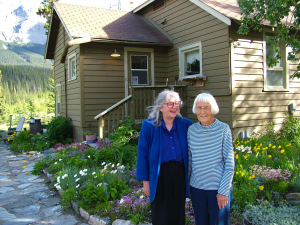
Marie and Dorothy Black at Saskatchewan River Crossing. Dorothy’s family was the first to live in the new house (circa 1940s) at the Crossing.
“So after the years as a seasonal, what did you do?”
(5:47) Well, the same things I did as a seasonal, because…they were full appointments and, in the ten and a half month cases, we got full benefits. They arranged it so that we worked at least…I can’t remember what the numbers were (at least 10 days in each month) but so that we were given credit for a month’s employment for every month of the year. It counted for our ‘pensionable time’, as they say. Which is why there was no hurry to become full-time because basically you were taken care of. Jasper was really good that way; they really took care of their people.
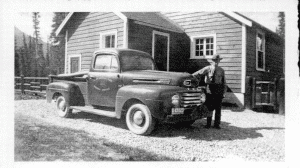
Warden Bill Black at Saskatchewan Crossing mid 1940s
“What were some of your main responsibilities?”
(6:45) Well, they varied because of the way Jasper was set up. They had the Function’ system, which nobody else had at that time. There was an assistant chief over ‘Enforcement’, an assistant chief over ‘Public Safety’, and one over ‘Resource Management’, and one over – they called it ‘Administration’. It was mostly logistics, helping the park work and helping everybody do their job – transportation and pick ups on the trails … like horse trails: when people were coming out on a trail, (after a long, back-country shift), you would go and pick them up … helicopter work, a lot of fire work, that type of thing. Every warden’s lot was a little of everything and that’s the big change or one of the biggest changes in the service, is that the ‘generalist’ (role) is gone now. It was a fight to stay generalists and everybody recognized that we were losing the battle with specialization. But we hung on as long as we could to be a ‘Jack of all trades’.
“I think my dad (former park warden Keith Everts) felt strongly about that as well.”
Everybody did, and it’s … there was a logic to the specialization that you couldn’t resist and that’s professionalism. To be professional and creditable, especially with other agencies, it just became more and more specialized to the point where people decided, “Well, this is what I really would like to do” – whether it was climbing or enforcement or whatever.
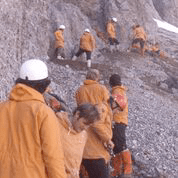
My first climb, Mt. Edith, kicking bivouac pads; Darro Stinson (looking down) foreground.
“What did you enjoy best about being a warden?”
(8:29) As far as the functions were concerned, enforcement.
There were no two ways about it! Enforcement, and the court work, that was my preference, by far.
“Is there anything, you didn’t enjoy or liked least about being a warden?”
(8:54) I think I remember seeing that question! It would be hard to answer because the whole lifestyle involved the good and the bad and you just rolled with the punches, which you had to do! I don’t know … camping out in the wilderness, on the ‘Eight Pass’ route, at 40 below! That might have been my least favorite – or getting sick on a climb – but you just did
it.
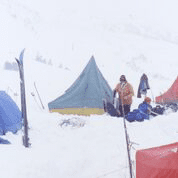
One of those ‘8-Pass’ trips
“This isn’t on the list of questions, but in terms of horses, did you have a lot of horse experience?” “Who did you learn a lot of those horse skills from?”
(9:34) Certainly in the service, yes, but prior to, no, not at all. I was a greenhorn and so was my wife. It was just along the way. In the first instance, Dale Loewen and Perry Jacobson would be the two guys out of Lake Louise. Dale, for the horsemanship and Perry, for the packing. Perry was my full-time ‘mentor’, I guess, but Dale was the guy who was mostly up at the Crossing. He kind of considered it his home away from home or his escape away from the big city. I don’t know, but I saw him up there quite a bit. And he is the one I asked most of the (riding) questions of, I believe.
“I did interview him, a few years ago.”
Well, then you know his style.
His answers weren’t always very informative! Like you could ask him how to ride, or how to weight the stirrups, or how to do it smoothly, to get serious about being a horseman. He’d say something like, “Well, I don’t know, I just kind of stay up there like a sack of potatoes.” And that’s what you had to go with! Dale did give me one piece of advice that served me throughout, and I’ve passed a generic version of it along to many others, disguised as a ‘rule of thirds’: he said that a good horseman should be able to hold silver dollars under his boots, all day long. The obscurity of it becomes clarity, when you live on a horse.
The Jasper job plunged us into full-time horse-work, immediately, both Marie and I, with an enlarged back-country district (Willow Creek + the Moosehorn) to take care of, with its 24&4 shifts until the snow started to pile up. And we had our mentors – the North Boundary Coordinator at that time, Brian Wallace, and his wife, Vicky, and they showed us how to live with, manage and take care of horses, over the months and the miles. That first summer I remember calculating, from my diary, that I had ridden about 1,600 miles – and Marie rode at least 600 of those miles, with me.
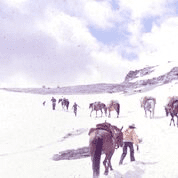
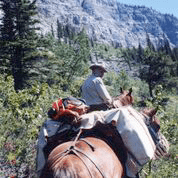
1976, going over ‘Hardscrabble Pass’
Marie, foreground; Brian & Vicky Wallace, leading. – 2000, heading into Egypt Lake, from the Kootenay side, via Hawk Cr. and over ‘Ball Pass’
“Speaking of Perry and Dale, are there any other characters or people that stick out in your mind from your years as a warden? Probably many?”
(11:15) You’re right; they are all characters! But it’s part of the job! I think you have to be a character to hang out. But Jim Rimmer to start with. I don’t know if anybody has interviewed him? Well, they wouldn’t be interviewing him now. He died a few years ago, maybe eight or ten? He was an Englishman, military, a very stiff-backed, straight-laced fellow. He didn’t have a family that I know of, not locally anyway. I think he retired somewhere in southern Alberta. He was strange in the sense of mysterious. Like he was bluff and bluster! He was an exceptional biologist or botanist, I would say. That is one of the things I remember (most) about him. He’d be on the slopes of Mount Wilson and identifying all the plants. He was very involved in following all the wildlife around, the sheep especially. He was…I don’t know how to describe him? He was a character, I guess, that’s the best way.
“I’ve heard stories about his dog, did he have a special dog?”
If you want Rimmer stories, talk to Perry Jacobson, because he tells them the best! Spook! Yeah, his dog Spook. If you know Don Cherry of hockey fame, Don Cherry’s favorite dog, Blue, was one of those types that Jim Rimmer had. Which I think is like an English Bulldog, or something.
“I’ve heard some humorous stories about Spook and Jim looking for him!”
Yeah, I miss the Rimmer stories; that is for sure! And Monty Rose was another character who liked to tell stories, and Rimmer stories in particular.
“Would they have been the same era?”
Very close. They were all there when I got there. I think Rimmer was the first to retire and then Monty and Perry last. I’m not sure if Dale went before Perry. But that was the crew that was around. Paul Kutzer was the area manager and in fact was the fellow who interviewed me for that fire tower job. I never got the fire tower, by the way. They just asked, because of the qualifications I came with, if I wanted to be a ‘Patrolman’ instead. Of course, I jumped at it!
“Did you know much about wardens prior to starting?”
(13:58) I lived, grew up in my last home, 20 miles from Point Pelee. All I knew about national parks was that you had to pay to get in!
“It is similar now.”
Yeah, a little more! I think when I came west, the entry permit was two bucks, I’m not sure now, but if you buy a yearly pass you are looking at $140, or so…That two dollar pass got you into any national park you wanted, for the year.
“What are some of the more memorable events of your warden service career?”
(14:47) Well, that’s the problem, because once you start thinking about that, they are everywhere. It’s a life of stories; I mean every warden is a book. Every warden has a book-full of stories, and more. Probably two or three books if you stop to think about it…that’s just the way the job was. It was addictive, you know, almost hypnotizing. It was just an adventure, a lifelong adventure! So the big things are multiple. You can’t really isolate one from another. Whether it was a climb, standing on top of a mountain. Alberta’s tallest was my tallest, that I ever got up: Mount Columbia. It was with a very good friend who was killed in an ice climbing accident. So you get the highs and the lows with the same people.
“That would help (develop) that sense of family or brotherhood.”
Well, for sure, more so when everything is teamwork. Whether it is a rescue or fire fighting. Enforcement was a little less so because you are often on your own. The team concept was huge (though) like in search and rescue. Some of the searches go on for a week or two. It’s like a military operation almost, with everybody doing their job. Fire, the same way – campaign fires, especially.
“Speaking of rescues, I’ve looked at Dale and Kathy’s book Guardians of the Peaks and they wrote about a couple of rescues that you were on…”
(16:45) You’ve just embarrassed me! I haven’t read her book, so I don’t know what she said about me.
“The one rescue was for Pat Sheehan. (Pat Sheenan, a respected member of Jasper’s public safety team, died in an ice climbing accident.).
That was the fellow who took me up Mount Columbia. He was training to be a full guide and I was one of his experiments, I guess, because I wasn’t a great climber, not on the ‘pointy end’ of my rope for most of my career! He got me up Columbia and we were both as pleased as punch.
And I ended up doing CPR on him – without success.
“That must have been incredibly difficult.”
It is, or was. It still brings a lump to the throat, like you don’t forget the people…
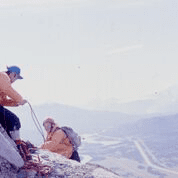
John Day being belayed by Rick Ralph, on Mt. Morro, Jasper
“The other story that Kathy and Dale mentioned that is quite harrowing is about the boy who fell in the crevasse and his father tried to rescue him.”
(17:50) Tyson Albrecht: that was another low point: They were a family from Utah. The whole thing was a memory. We got sued for, I don’t know, inadequate performance, or slow response or something, but that was beside the point really, because the tragedy was the kid … and the image that stays from that one is the dad … the father, holding the end of a rope, and at the other end of it was his son, down in a crevasse. He’d been given that assignment by the first person on scene, who was a guide, and the guide couldn’t get him out. So he left the rope in the father’s hands. He said he had to get back to his people because they were stranded in a crevasse field. By the time we got there, that was the image that we faced. This father is standing there, holding a rope to his son.
“I can’t imagine. That would be one that you would never forget.”
No, you can’t.
The memory is of his pain, not so much our actions. Just to see that type of pain…and you are exposed to that all the time. Whether it is traffic accidents or rescues. A lot of multiple fatalities – triple fatalities were not uncommon because three on a rope is quite common. That’s just the way the job went.
“Were there any wildlife stories…?
(19:32) Yeah, constant! It’s the same thing, whether it is bears in the campground or a bear that had to be put down, or bears on your porch or whatever it is. Bears were the constant theme! Well – two stories, just as you speak, come to mind. One I felt I had to shoot a bear when I was still a term warden at Saskatchewan Crossing. I thought I was going to die that day…we were looking for a lost person. At least I was up at the north end of the park, at the Hilda Creek Hostel. It was early spring and there were piles of snow all around but there were tracks into the hostel. So I figured I had better walk in to see if our missing person was making lunch or something. Sure enough there was a noise in one of the cabins. When I started up the steps to the open door, I called out to whomever was inside and saw that an old garbage can was turned over, on the floor inside, and suddenly realized what I was walking into! As I realized it, that bear came charging out of the window next to me. He just blew the window right out and landed on a snowdrift right above my head. I figured that was it! “Who’s going to tell my wife?” It was that kind of a feeling, you know: “Is this going to hurt?” He just stood there and looked at me as I backed away, one slow step at a time. Eventually I just turned and walked away. I figured, “I’m not going to look at him anymore.” That’s kind of threatening to him. I walked back to my truck … and I didn’t go back and shoot him right away because I thought, “Well, maybe he’ll leave?” But somebody else walking in on him was a chance I didn’t really want to take; but I didn’t want to shoot him either. So I went for a bit of a hike, still looking for this lost person, checking the trails around Parker’s cabin … and saw about four more grizzly bears.
“Wow!”
Well, it was springtime; they were just out from their dens.
They were all over the place up there, in the high country. Then I went back a couple of hours later and that thing was still there – no longer on the same snow drift, but out in front of the cabin, so I figure I can’t go home and leave him here because somebody is going to walk in on him and it might hurt. So I shot him and got a bit of flack over it. So, that’s another low point: having your judgment questioned … and taking out a grizzly bear. Because I was just a term; I hadn’t been around that long. Once the story got back to the people in charge, it just seemed like I was a little bit presumptuous. But the chief warden supported it anyway.
“Who was the chief warden at the time?”
Andy Anderson.
He did support it because he was coming down from Jasper that day and I told him what happened. He stopped in, at the station, so I explained what I had just done. He basically said, “Oh yeah, once they start breaking into cabins, there is not much else that you can do”, and left it at that. So I felt pretty good for a while, but once the story got, again, circulated around, he kind of changed sides on me a little bit. He decided that maybe I shouldn’t have done it. And there were other aspects to the story too. There was a highway crew up there working on guardrails. Jasper took care of that section of our highway in the winter, with the snowplowing and everything. I didn’t want to bother them…and there was no radio communication from there, either.
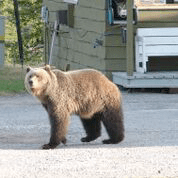
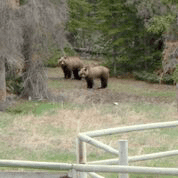
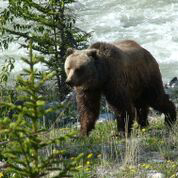
Grizzlies – around the Crossing buildings and corrals A grizzly crossing Owen Creek.
(23:22) In those days we didn’t have the (warden) repeater system, so it was – you had to get to specific spots to make your radio calls. The repeater system is one of the big advances. You can’t use a cell phone up there now, so it was the same feeling, except that there was just zero communication until you got to a location where you knew the signal would get out.
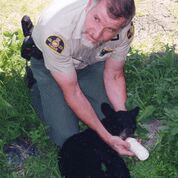
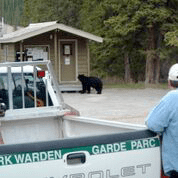
Black bears around the Crossing and at the office.
“Were there quite a few of these locations? Did you have to travel far?”
Basically, the highway itself; once you got past Bow Summit, you were out of communication – and maybe a little bit past, but not much. Once you got up to the Ice Fields – actually no! You couldn’t even call Jasper from the Ice Fields in those days. I think you had to be around Honeymoon Hill. My memory on this ancient history is a bit fuzzy; but anyway, the repeater system changed everything, even in the back-country. As I recall, remote communications in that era were limited to VHF simplex channels – i.e. truck-to-truck – or – HF ‘single side-band’ (SSB) radios at the warden stations and in major back-country cabins. For rescues or wrecks along the highway, we had to station a truck on a high point, like Bow Summit, to relay situational information down the other side.
Once you got into the back-country, you were on your own, with a single sideband that may work and may not work. So communications with people out in the front country were really spotty and it wasn’t a big deal. They just accepted that you could take care of yourself and “We’ll see you in 24 days!” NOT quite. There were portables, heavy ‘porta-phones’, full of batteries, like the PT-500 ‘lunch-buckets’ – but no repeaters. Though daily calls on the SSB were attempted, missed calls would not launch a rescue mission. That changed in 1979, with the Neil Colgan incident. Our Dispatch, or the back-country co-ordinators, in Jasper, attempted calls with each district warden every day, either on the SSB or the old crank phones, and the district wardens attempted SSB or phone calls to exchange info and plans, or just to BS, every evening. On the SSB, we could hear the Banff wardens doing the same, often hearing them better than we could hear our own dispatch, or even our near-neighbours. If something of importance needed transmitting, it usually got through – eventually. When the repeaters started to appear – 1975-ish for Mt. Stephen, in Yoho – things started to change.)
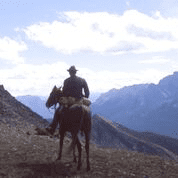
Boundary patrol.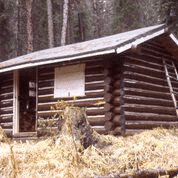
Jasper’s ‘Wolverine’ cabin.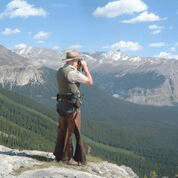
Sunset Pass, in Banff
“That sort of leads into my next question about the changes in the warden service. So communication did improve?”
(25:04) Communications, and technology in general, of course. I guess the biggest change would have been women in the warden service. There were none when I started and I think Kathy was the first, actually. She was in Yoho, so I never worked with her when I was down in Banff. But no, it was a man’s world as they say.
“I have interviewed Kathy and a few spouses, but no other female wardens, which I think we should look into…”
I don’t know, some were rough and ready (female wardens) and some were quite feminine, so they are all different. In the sense of education, they all came with credentials. But they weren’t all, what would you say? Attuned to the backcountry life. Like Jean Stoner, up in Jasper, she was a man’s man and she could handle herself. And Lisa Paulson, I don’t know if you have interviewed her, or if she is a little too young, maybe? She’s got some stories to tell about working in the back-country. She is the equal of any man out there, that is for sure. She would be a great interview! Betty Beswick was one of the daintier types – again, fully qualified, degrees, I think more than one, related to resource management and environmental design, that type of thing. But she quickly left the service. She didn’t leave Parks, she went into regional office.
In the system that we were in at the time, we were GT1s, as a seasonal, and she went from a one to a four position in regional office and I (had) never heard of anybody jumping three classification levels like that. But Betty did – and I am sure that she had a wonderful career. She would be another great interview.
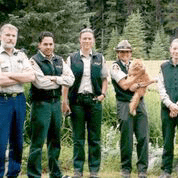
The Kootenay Crossing Crew (including ‘Terry’s Angels’) –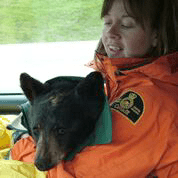
Brianna Burley (with a cub found at roadside)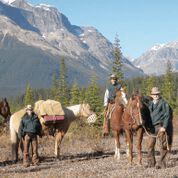
– On patrol w/Tawnya Hewitt & Sara Jaward
“What year did you retire from the service?”
(27:31) Five years ago, whatever that is – 2013 I made it 40 years on the calendar, from May of 1973 to May of 2013. Again, all of that wasn’t ‘pensionable’ because of the term positions and the first seasonal positions, which were only six months. It didn’t come out to the full 35 quota – I think and a half years in recorded time – but on the calendar, it was 40 years total, almost to the day.
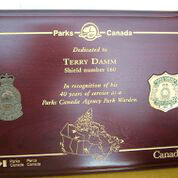
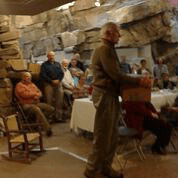
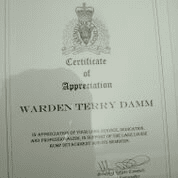
Lake Louise retirement party and memorabilia.
“Were most of the 40 years in Jasper or did you work in other parks?
(28: 20) Five different parks and Regional Office for a winter. 18 years in Jasper, six years in Kootenay and the rest in Banff and Rev-Glacier, mostly at Saskatchewan Crossing. We spent our whole … when I say ‘we’: my wife Marie and I – because she was part of the team that I was on.
I would definitely like to add one more thought: not nearly enough mention or attention was given to Marie’s role in those forty years. She was the legal secretary, prim and proper, taken out of the big city (St. Catharines) and plunked into a cabin in the wilderness, and she never missed a beat. In fact, she was the signing bonus that Parks received, for hiring me – that unfair advantage that every married warden knows he has, as the intro to “The Holroyd Chronicles” put it. Whether station landscaping and beautification, acting as the unofficial park information centre, or keeping the horses moving on the trail – wherever we were – Parks got a great deal. People didn’t stop knocking on our door when I was away from a station either, whether on patrol for the day, or across the country on a course. Marie assisted stranded travellers on a moment’s notice, often for hours at a time, occasionally bus-loads of them – fed them, entertained their kids, put them up for the night, prayed with them – and several from around the world remain friends and correspond with us, to this day. In fact, while away on one of my Ottawa training courses, I stopped off to attend my mother’s 90th birthday party in Essex, on the way back west. I was watching the news with family one night and noticed pictures of Mt. Wilson, which we could see out our kitchen window, at the Crossing. I had no sooner mentioned that this was taken my area, than they were showing pictures of the warden station … and before my mind could sort that out, there was Marie, being interviewed in a story about a big rescue in the area. Three ice climbers from the U. S. had been swept off a climb by an avalanche on Wilson the day before, and surviving members of the group had come to the station to report the accident late that night. Marie knew the radio system and had our dispatch wake up the on-call rescue response, putting them on the phone with the reporting party, then waiting up with them until the rescue team arrived at first light to do the search. (All were recovered, deceased.).. and so it went, not always so dramatic (or so well publicized … in fact, Marie got more press out of that one than I managed to accumulate in 40 years.
Anyway, we spent it all, but the last three years, at warden stations, or in the backcountry. But we always had a station home, in the front-country. Only the last three years, and that was kicking and screaming that they dragged me into Lake Louise, just because of the position that I was in. They said “you have to be in the main office. You can’t do it from where you want to” – which was Saskatchewan Crossing. And they might have been right but, as a result, the north part of Banff park just got totally ignored.
“Yeah, you would have seen many, many changes over the 40 years.”
Yeah, most of the stations we worked at are run down, or burned down, or bulldozed, or empty right now.
“I interviewed Marv Miller a few weeks ago and he was speaking of the same thing, but he was talking about Riding Mountain and the closing of all those stations. There, especially, he said it was a real problem because you could access the park from anywhere…”
Well, that’s the point, the back-country is important because it is most of the park. I mean the highway is just where the trains and the tanker trucks go by. But most of the park is back-country. It used to be taken care of, I won’t say to perfection, but it showed that we were interested in it. Assignments were back-country assignments. You weren’t expected to be out; in fact, if you were out, you got a question, like “Why are you out?” “Well, I am on my days off.” “Well, hurry up and get back in there!” They cared. I wasn’t part of that era that actually lived back there. My time back there was ‘seasonal’, only five or six months…but, when I worked there, there were (still) wardens that had lived and had their children and educated them in the backcountry. That’s the way that it used to be, as your dad would know.
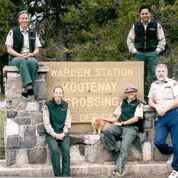
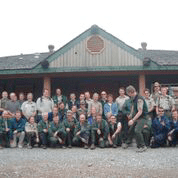
That Kootenay Crew, again (c2000) – and the KYLL Group: 3 offices, in LL for a meeting (2004)
“That last job, when you had to move to Lake Louise, what was that position?”
(31:06) That was the warden supervisor position, for Lake Louise, Yoho and Kootenay National Parks. The beginning of the armed service. Well, I shouldn’t say that, because we’ve been armed throughout (our history), but the beginning of the officially, (nationally)- recognized, armed service.
“What was it about the warden service that was important to you?”
(31:46) Interesting question! That’s one of the compulsive things about the job, is that it all seemed important at the time. Now I can look back on wrestling with drunks in the campground and having people turn the music down so that other people could camp in peace. It seems a little bit frivolous right now – or ‘keep your dog on a leash’ type stuff – but at the time, everything had its own rationale and it was all-important. To me, it was a ‘’people’ job. Whether you are helping them or interfering with their evil activities, it was dealing with people. It is the nature of people to need help or create problems. So that is … the important thing is, we were mediators, I guess. I never thought of it that way in any sense before…But we were always mediating something – intervening in something – and it always seemed to be important work.
“Are there any legends or stories associated with the warden service that you might share?”
(33:05) As they say: “legend in his own mind”! There are hero stories everywhere. People doing things that you marvel at! Some of the Tim Auger stories that are in the mind right now. (Tim Auger was the Public Safety Specialist for Banff National Park and recipient of the Summit of Excellence award. He passed away August 10, 2018.) There were movies made of what he was doing, like the rescues. There were funny ‘hero’ stories. Even in training there were hero stories. Like Jay Morton, I wish you could interview that guy but he is long gone. But he told stories of when they were first bringing in the helicopter rescue system with Peter Fuhrmann: They were training off of Mount Rundle and he hooked up to be slung off the mountain and he didn’t get his carabiner through the loop. He got it with the open end of the carabiner resting on the steel loop that he was supposed to be firmly attached to. And he rode all the way down with that carabiner open and hanging by its tip from that ring that hangs under the helicopter! And to talk about it, it seems I don’t know whether stupidity or a miraculous occurrence is the way to describe it! But it’s the type of thing that is life and death and yet it gets joked about and mostly by Jay himself, when he
was telling the story!
“You’ve spoken about a few people who stand out, like Jim Rimmer, Tim Auger, Jay Morton, and some of the female wardens you worked with. Is there anybody else that you would like to add?”
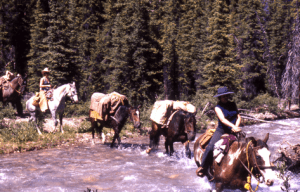
(34:59) Well…all of them! Rory Flanagan was in the highest management position that I was personally familiar with. All the Ottawa managers would take their tour every couple of years, you’d see somebody out of the ‘big smoke’, as they would say. But Rory Flanagan was a superintendent’s superintendent and a warden’s superintendent. He’s the fellow who authorized the arming of the warden service in 1976, in Jasper. He’s always stuck in my mind because – he’d throw a Christmas party every year, for instance, and everybody from the mechanics in the garage to the lowly seasonal warden was invited. He was just a gregarious, sociable, affable, approachable type of guy! I couldn’t say enough about him!
“I knew the name, but I didn’t have any stories, so that is good to add.”
Well, I still visit his wife; she is still alive. He died several years ago. But I don’t go back through Jasper without trying to see Mildred, just because they were such an open couple. They loved the park; they loved the people and they were concerned with ‘their’ people as well. There is the common saying that ‘our people are our most important asset’, but you never get that feeling, when it is coming out of Ottawa, but you sure got it with Rory…I’m going to kick myself after this phone call because I am sure there are dozens of people that I should be mentioning…Alfie Burstrom just popped into mind, the first dog handler in Parks. I worked with him quite a bit. I haven’t seen him since his wife died; that was fairly recently – in the last year I think…I can’t tell some stores! I am remembering some but they shouldn’t be told except for first hand, not for an official archive. That’s another thing: nobody will ever know all the stories of the warden service. In fact, I think Donny Mickle just put out a request for stories. They are trying to build an archive of warden stories. I think they are looking (more) for hilarity or comedy, but I don’t think you could ever encapsulate all of the stories of the warden service or ever imagine some of them! They are pretty wild in some cases. (Not involving me, personally, of course.) In some cases the stories are just personal tragedies…
(38:23) One little story, (as a ‘for instance’,) that didn’t involve the warden service directly – except to rescue an RCMP officer … One of the cops in Lake Louise, long, long ago, who shall remain nameless because I can’t remember his name! He just got drunk one night and that was during the era of hippies, when hitchhikers were going through, the scraggly, bearded, dope smoking types. (You still see them around occasionally.) But he was mad at hippies and when he got drunk, he didn’t have any control. He went out to … there was a bit of an encampment in the Niblock pit, where the hitchhikers would go and build their fires … and he just went up on a big gravel pile in the middle of that camp and started firing his gun off, yelling and swearing at all these hippies! He had to be pulled away and hidden away by the wardens just to protect his reputation, and his job, probably, if it had ever been found out. But that’s the type of thing that you are not (normally) going to get in a neat interview. I haven’t thought of that for years, maybe decades, but that is the type of thing that’s in the background and every now and then, a memory goes by and you just shake your head – or burst out laughing!
“Is there anything about the warden service as you knew it that you would want future generations to know?”
(39:59 ) Well, it’s all “those were the days” type stuff, because it is not going to be repeated, unless we have a nuclear war and start all over again. I think I was … and we were … the luckiest generation, to hit it at just the right time. And we’ve gone through the transition, which occupied almost 25 to 30 percent of my time, anyway, the transition in the service. And people are just not going to remember it or experience it, which is sad. I kind of mourn for the warden service. I remember it; I’ve got a lot of happy memories; but it’s gone. The service that cared about the back-country and (real) coverage. Like our coverage … now that maybe shouldn’t be part of the interview, but we have backed away from much of the work of the park. In Lake Louise we had no regular back-country patrol capability. Now Banff does. They’ve got a good couple of wardens there that love the horse work and they get out on their boundary. Lake Louise (LLYK) doesn’t have a similar (travelable-huntable) boundary situation to concentrate on, for one thing. So Banff is taken care of a little more traditionally. But the days are gone, you know, of the 24 day shifts and the trail clearing and the routine maintenance and the checking of fishing licenses. All that stuff in the back-country is gone; we respond now. So if somebody calls in on their satellite phone and says, “There are campers making a mess” or cutting down trees in a back-country campsite, we’ve got to get a helicopter and fly in, if the budget allows. And I say “we”, but I’ve been away from it for five years, so I really can’t speak to right now. But that’s the way it seemed: the new, reorganized warden service was quite deficient and undermanned or however you want to put it – under-personed; pardon me.
“A lot of people that I’ve spoken to share your sentiments…that you were probably one of the luckiest generation.”
I don’t think there is any doubt about it! Every generation may think that, I don’t know. Every generation always looks back on the ‘Golden Era’, I guess, but as far as I am concerned, we had it.
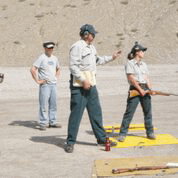
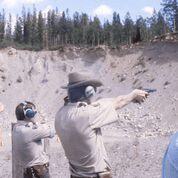
Long-gun qualifying – (Yoho – 2011) Hand-gun qualifying – (Jasper – c.1978)
“You have answered this question, about what made the warden service such an unique organization…is there anything else that you would like to add?
· (43:03) I don’t know how to – I could express it, I suppose, because everything is expressible; it’s just words. I may send you something in writing, I write better than I think…Imagine a job where your job is to go out and help people all day long and look for problems and solve problems. It’s a very satisfying life. The problems come to you; like, you are not out there looking for stories or trying to change the world. It’s just what comes your way. It’s what ends up on your plate, not because you’ve served yourself, it’s just what’s been dished out to you. And it’s always, to me, important, and certainly interesting, and sometimes entertaining, even in a comedic way, but also in an adventurous way. It’s a lifetime of adventure and that’s why it is so compelling…
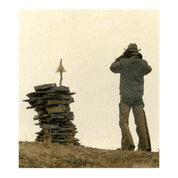
I’z the by what builds the cairns, an’ I’z the by what stands there.
“Do you have any lasting memories that you would like to share? You’ve talked about Saskatchewan Crossing being a very special place.”
(44:48) Yeah, drive by it now…It’s a wreck. It looks like an abandoned railway station from the era of great railroads, or something. There may even be somebody living in the big house that’s there, like maybe…well not an interpreter, they hardly do that anymore. You know, when we moved to Saskatchewan River Crossing there was an interpretive trailer, they had an office, an interpretive office, up in a big turn out. There were three interpreters there, full-time (summer) positions. The campground staff lived there too. We met a lot of good people that passed through the Crossing. It was a humming hive of activity. And rationally, again, so – because there were three campgrounds at the time, there are only two now. There was an (entry) gate, a resort, two youth hostels, as they used to call them; now they are just hostels (Hostelling International). It was just a hive of activity and endless work. The work, of course, being the routine. It may have started at five in the morning with a knock at the door, or at two in the morning or at six at night when you just got home after a long day. It was just people, all the time…
(46:39) Your questions are bringing back the memories… The loss of friends, I’ve got a low-point line, here. It started way back about 1974 or ’75, when Wilf Etherington got killed by a grizzly bear in the Crossing district. He was a (CWS) biologist who was working with the bears at that time. The bear was taken in, flown, into the back-country and the crew hung around to watch it and make sure that it came out of the anesthetic. It came out and it came out fighting. It got a hold of Wilf and killed him. That was the first friend that I lost ‘in the line of duty’.
Actually, my job was open because of two wardens who got killed in a traffic accident the year before…death is part of the warden life, whether it is the public and wrecks on the mountain, or on the highway, or the loss of (Park) friends. I have two that have been killed in climbing accidents. There was another one and he was from Sunwapta warden station. He was killed in an avalanche up at Parker Ridge. He was an acquaintance, rather than a friend; I never actually worked with him. I would just meet him in passing on the boundary – he did the north side and I did the south side. Death is always with us – death and taxes, as they say.
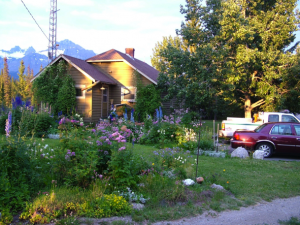
Marie’s carefully tended flowers at Saskatchewan Crossing Warden Station.
(48:19) But the happy days, in fact the best memories … when I go through my slide show … I had a slide show put together for my retirement party; it had 1100 slides in it, but I would say most of them are of the back-country and of horses. Just the life, what people might call the real life, not the office life or the paper life – out in the park itself. Dealing with the park and the visitors.
“Do you ever miss being a warden in retirement?”
(49:04) Well, I certainly miss the people, but I don’t wish myself back trying to settle down a bunch of drunks in the campground. No. Those are the things that you are just happy to get away from. But yeah, when I hear of a big investigation or big events that are going on, I kind of get involved in my head anyway, or communicate with other retired wardens about what the old guys would do! It’s kind of a lot of fun – but no, it’s not a miss, in that I wish I was there, sense but just the nostalgia, I guess…the friendships, I don’t know how else to describe it. I’ve already said I mourn for it, so that is a type of missing too. It’s the lifestyle that is gone. It can’t come back…the past is passed, as they say, so there is no point in dwelling on it, but that’s what we retirees do!
“You retired in 2013, what do you enjoy doing in retirement? It sounds like you keep very busy.”
(50:26) Well actually, I try not to be busy! I more or less vowed that I wasn’t going to join any clubs, or societies, or volunteer or anything and just see if I could really retire! My wife keeps me busier that most other things; she’s always got another hole to dig in the garden somewhere or a tree to be cut – or trees. That is what I was doing yesterday – just cleaning up our little property here. We’ve got a lot of dead trees and she is using them for mulch in her gardens. I don’t know what you would call her – a ‘gardening pioneer’. She’s doing all sorts of new and wonderful stuff, like trapping heat underground and building what they call hugelkulturs. It is almost like a compost pile that you garden on top of and it keeps it warmer in the winter … all sorts of spacey theories, but she knows what she is doing and I just kind of tag along!
“You are quite far north, so it would require a lot of gardening innovations.
Well, we may be far north, but that gives you a longer gardening day. Quite often we will eat supper after 11 o’clock at night because it is still light out there, so she can be in the garden. We’ve gained, I’d say, at least a month, six weeks of growing season, by moving up here. Especially because of the daylight, but the climate is much more moderate here than in the Rockies anyways. So we don’t get the 40 belows here. No, it’s great! The fishing is good, the berry picking is good. That is part of my job, food gathering, you might say. It’s just very primitive, but we’ve got an acreage. I spend a lot of time doing what I used to do, clearing trail and, in this case, fence lines. I think my whole life has been in preparation for living as we do. We are rural. We have to go half an hour to get our groceries, so we are still kind of in the back-country here.
“To get groceries where would you go?”
Smithers. We are about half an hour out of Smithers (Terry and Marie live rurally near Telkwa, B.C.) It’s not a big town, but it is kind of central.
“Do you have a lot of smoke?”
Especially with all the fires around, just now. At the airport there, one of the air traffic controllers said he was as busy there as he ever was in Vancouver. Because there are (now) about 150 flights a day plus the regular scheduled flights that are in and out. He’s (as) busy as a one armed paper hanger, as they say! Well, we have been blessed. I’ve got friends, another retired warden, Mike Comeau, and he lives about 75 miles east of us and he is fighting for his house. He’s got a hose lay
around his house, sprinklers on the roof (two pumps in the lake) and he has been breathing smoke for a couple of weeks. He’s surrounded by fire. Right now I am looking at a horrible haze in the distance, but the smell has left. We had a lot of smoke smell this morning because of the humidity. The humidity keeps the smoke local, like down, and right now it’s high and across the valley. But we’ve got ringside seats to the big fire clouds from the Nadina Lake fire, which is 50 miles from us. But just about every day, every hot day for sure, it kicks up a huge pyrocumulus. In fact sometimes three or four-headed clouds coming up over the ridges here because it is like sixty thousand acres, or something. It is huge! That’s another thing I miss: overtime. I don’t get overtime now; they’ve got to put an overtime provision in our pension somewhere!
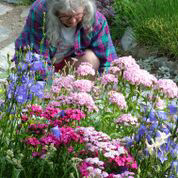
Photo Marie, tending one of her many gardens – Sask. Crossing (2005)
“Is there anything else that you would like to add…”
(54:45) Well, the stories are everywhere. It’s no trouble to tell a story, but to pick the right story… that was one of the reasons, I think, I got my job. Well two reasons that I got that supervisory job. One is, I had a good friend, I was his Field Training Officer (FTO) for two years, I guess. He’s now a biologist up in the Yukon. He put in a letter of reference for me. They asked us to have one supervisor, and one person that we had supervised, and somebody else as a reference. I can’t remember … somebody outside of Parks. Whatever – they did anyway, and the fellow who, I was his training officer, he put in an excellent letter of reference and I give him a lot of credit for getting me that job.
They also asked for a story from when the warden service was all upside down and actually (had been) taken out of enforcement. We weren’t allowed to do enforcement for two years. The RCMP was brought in, at great expense, to do the job. They asked for one story from that period of time … (about) how I dealt with it. Well, there was a fire, a smoke, in around Waterfowl Lake, just south of Saskatchewan Crossing, during a high hazard. There was a smoke down by the river and I didn’t know what it was … lightning strike or who knows what? There were no cars in the area. So I went into the bush and there was a motorcycle hidden in the bush, covered with a tarp. Obviously somebody was there, camped. It was an American plate – Oregon, I think. I ran the plate and got enough information to know that it wasn’t a wanted vehicle, but they wouldn’t give me anything else about who it belonged to or what the record might have been, in the States … if they were good guys or bad guys. I just walked in on it and found this guy asleep around the fire. Typical motorcycle type, tattooed, curled up in a ball around an empty whiskey bottle and a tent. He was outside the tent. I didn’t know if there was anybody in the tent or not. I walked around and took a few pictures and he just wasn’t waking up. Then I heard somebody in the tent getting up. So I went over and gave this guy a little kick in the foot to wake him up and he turned out to be the most pleasant guy! He had a girlfriend, whom he allowed to have the tent, all to herself, and he slept out in the cold, by the fire, all night. Everybody was full of apologies and the usual excuses about getting tired and had to pull off. He didn’t know anything about the fire restrictions. Anyway, it just worked out wonderfully and the problem was solved. But I guess that story impressed them (i.e. my interview board) enough … that I was still doing the job that I was supposed to do, without getting too sour, I guess, on the service. Just trying to hang in there and let things work out and go with the flow, as they say. So that story and that letter of reference are what I credit with getting me the next-level job. That’s about all that comes to mind right now for stories.
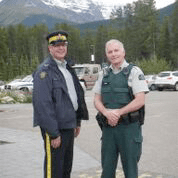
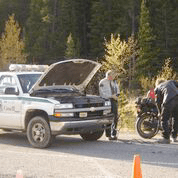
With good friend, Cpl. Vandenbrink (Lake Louise) Assisting a biker with a boost (David Thompson Gate)
“What year would that have been when they brought in the RCMP to do the enforcement?”
(58:36) Turn of the century I think, around 2000 or 2002, somewhere in there. I’d have to check or go through some old diaries to find out. But it was two full years for sure, maybe a little more and the cost…well, they admit to forty million, but it was probably over one hundred million by the time it was done. Like they bought them 4x4s and rescue boats and all sorts of things – toys that they didn’t have but were going to need to work in the parks and it was right across Canada, so the expense was huge. That is the saddest chapter of the warden service and, like I say, it occupied 25 to 30 percent of my career time, so it wasn’t all a bed of roses. But I am not the guy to write that story because there were people so much closer to the politics of it and it is a political story more than anything…(unfortunately).
(1:01:23) Another good story teller is Ivan Phillips…he retired before I did, but he has got all kinds of stories. Once he retired, he went back to work with Alberta Sustainable Environment or whatever they call their department over there. I still keep in touch with him. He’s got the same career path that I had. He also had one of those ten and a half month positions and we more or less played leap frog over the different warden stations for a while.
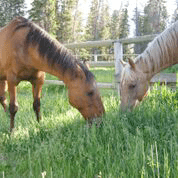
Ponies at the Saskatchewan River Warden Station.
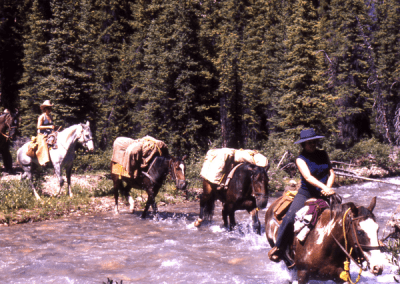
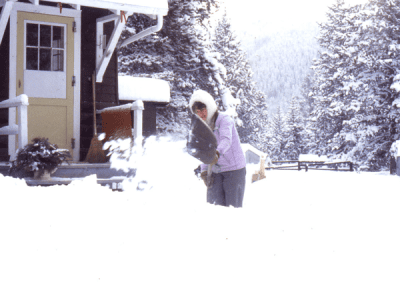
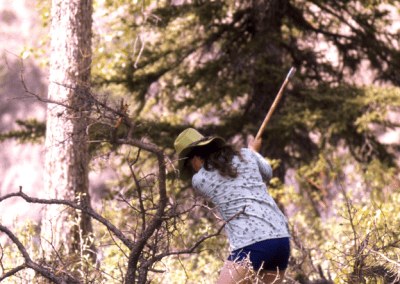
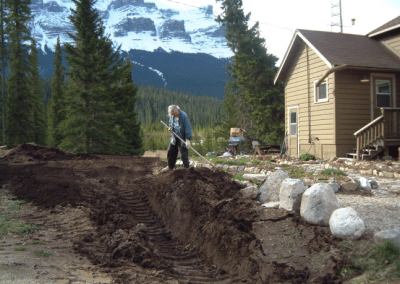
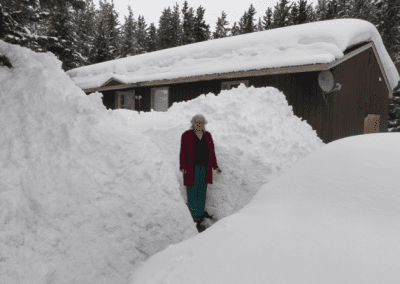
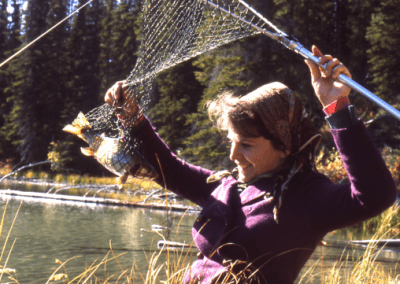
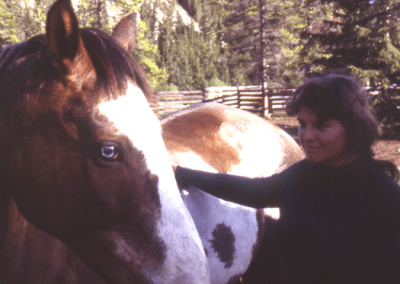
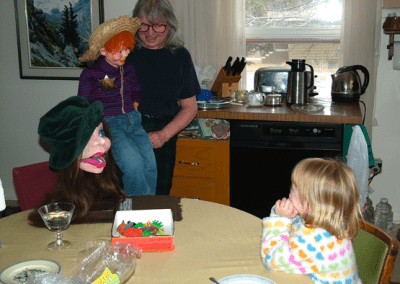
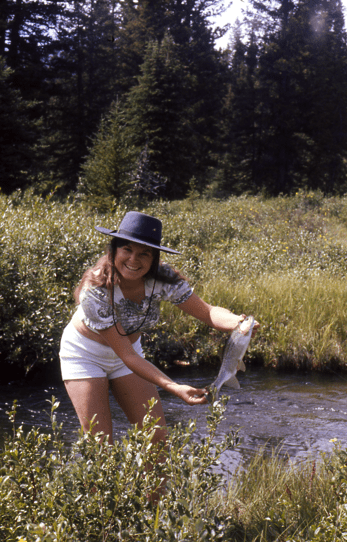
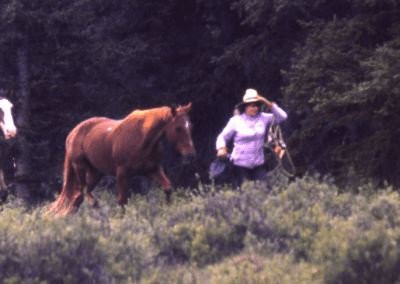
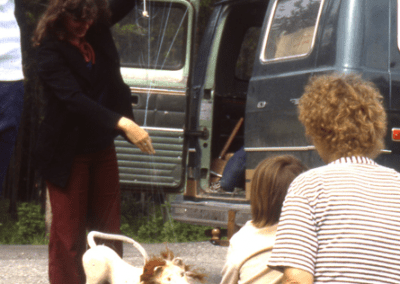
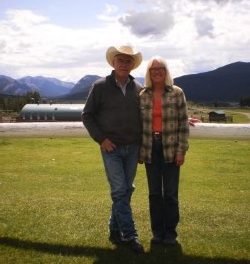

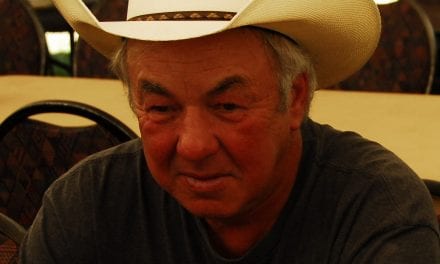
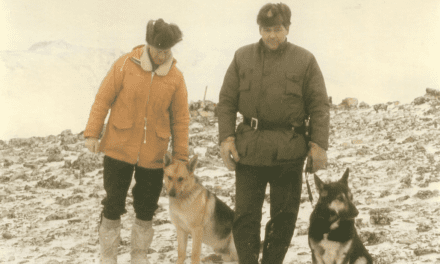
We were lucky enough to meet Terry and Marie when we’re campground hosting for Parks Canada. Some time at Waterfowl Lakes, some in Banff and some at Macleod Meadows. A favorite memory is, when some campers ( in a couple of adjacent sites) chose not to leave by the checkout time and to play loud music while they had lunch. We’d asked them nicely when they planned .to be on their way, but got no cooperation. Terry came by in the Warden truck and how things were, then drove around to the troublesome spot, parked, put on his warden hat and just sat there!! The music was turned down pretty fast, and when asked when they planned to leave, started to pack up quickly. No yelling, no confrontation, just a polite expectation that the rules would be obeyed,
Another time at Macleod Meadows, Terry stopped in to see how things were and we reported what we thought were gunshot sounds. Terry did and check of the campground for weapons…none were found, but heard the sounds that we did. So, he called another Warden and they searched both sides of the highway for quite a distance, in case there were poachers in the area. No,not .that either. So back he came for more information, then, as he was driving out of the park he thought his truck backfired. That was odd,so he got out to checked and found quite a few “cap pistol tapes” the old pink things with tiny bits of black explosives on the, scattered over the highway. They were rolled into little balls and went off every time a vehicle drove over over one. A bit of mischief, that caused the waste of too much Warden time, but Terry just took it all in stride.
We are pleased to stay in touch with this lovely couple and hope to be able to visit them one of these days in their retirement home and to see Marie’s gardens, We were lucky enough to be told about Terry’s retirement party, by one of the other staff members and to able to attend the function….a well deserved tribute to a really nice couple
Anne ad John Godsman. Strathmore. Alberta
What a pleasure to read this. I worked at the Icefield Visitor Centre from 1987-1996, and so knew and worked with Terry during some of his Sunwapta years and Saskatchewan Crossing years. Some of the events Terry touched on are memories we share, albeit in different contexts. His was the active role as a park warden; mine was to record, report, and hold the fort. Which I was happy to do. It had its own exciting moments.
One quiet fall day at the Icefield Centre (the old one, not the one that is there today), I heard Terry being called on the park radio – but surprisingly, he wasn’t responding. Shortly afterwards, the front door opened and Terry came charging through, heading straight for the front desk, calling out, “Clear the way!” Astonished, I stood back and watched Terry vault over the counter as if he’d been training for it all his life, and vanish into our staff room, where the base radio was situated. It turned out that he’d heard his call sign (Whiskey 3) as he was driving towards the Icefield, but his radio wouldn’t let him respond. So Terry, never daunted, headed to the nearest base radio, which happened to be ours. I will never forget the sight of him leaping over the front counter; by not running around its end to access the staff room, he must have shaved at least two or three seconds off his response time! And the issue? Some guy had been reported driving south along the Icefields Parkway with elk antlers visible in the back of his pick up truck. Terry left, except this time, he didn’t vault over the counter (darn it!). As for the fellow with the elk antlers, Terry was able to intercept him, and learn that he had them legally following a hunt in B.C. – but perhaps should have given more thought to their transportation before driving through the middle of a national park with them!
Good times, good memories. Thanks Terry – I am so glad our paths crossed during those Icefield years.